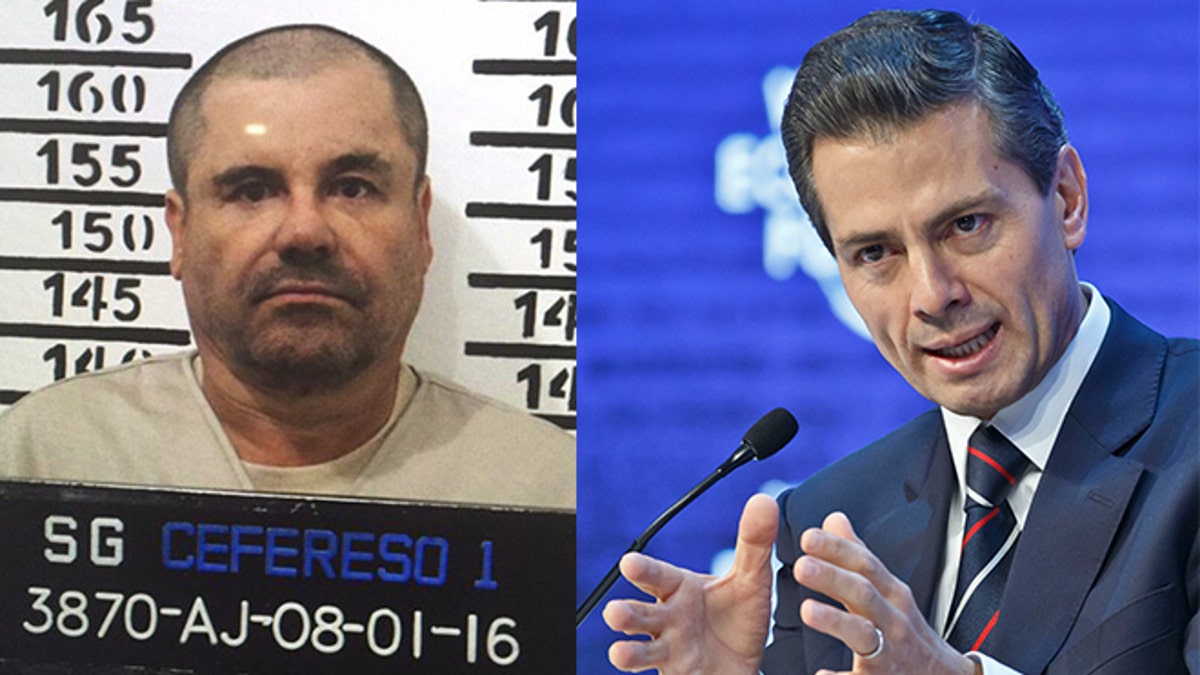
Joaquin 'El Chapo' Guzman and Mexican President Enrique Pena Nieto. (AP)
Mexico City – After Sinaloa Cartel kingpin Joaquín “El Chapo” Guzmán’s recapture earlier this year, the embattled Mexican President Enrique Peña Nieto celebrated the news by tweeting: “Mission accomplished.”
But some say Peña Nieto would be well advised to postpone his victory lap.
The Sinaloa Cartel is large enough to survive his recapture, experts say, and the cracks in Peña Nieto’s security policy have been exposed too deeply merely to be papered over.
"Mission accomplished?" journalist Manuel Ureste, of the news site Animal Político, told Fox News Latino. "Of course not. His escape showed just how fragile and corrupt Mexican institutions and police forces really are. The edge has been taken off international ridicule [by his recapture], but one hyped-up arrest isn't going to fix the country's prisons and polices."
Alejandro Schtulmann, head of research at Mexico City-based security risk analysis company EMPRA, agrees that Guzmán’s arrest only does superficial damage to his Sinaloa Cartel. "[The organization] remains Mexico’s last true cartel, because they participate throughout the production chain of illicit substances, from the cultivation of coca in South America to distribution and resale in other markets.”
But Schtulmann also considers that Peña Nieto may have taken his eye off the ball in pursuing Guzmán so relentlessly.
“The Sinaloa Cartel is less confrontational toward government institutions, unlike more insurgent-style groups such as the Zetas,” he told Fox News Latino. “Efforts begun under [former president] Felipe Calderón pinned them back in 2012 and 2013, but they have regained territory over the last two years.”
Gustavo Gil, a researcher at Mexico City’s Integralia consulting firm, told FNL, “As long as Mexico cannot get its institutions to impose the rule of law, the country cannot start down the path of development.”
And Guzmán’s incarceration doesn’t bring the country any closer to that goal. “Government figures show that 94 percent of crimes go unsolved in Mexico, while routine human rights violations remain a part of the Army’s strategy in fighting crime.”
Indeed, the military operation in the so-called Golden Triangle area of Sinaloa, Durango and Michoacán states that eventually led to the capture of Guzmán after six months on the lam drew complaints from civilians who watched helicopters strafe homes and vehicles with bullets and displace hundreds of residents.
Gil added that so far Peña Nieto appears to have reneged on his election promise to launch “a new strategy to reduce violence and ... protect the lives of Mexicans.”
At the time, Peña Nieto’s comments were interpreted as a condemnation of Calderón’s strategy, under which Mexican security forces are estimated by Human Rights Watch to have killed 70,000 people and “disappeared” a further 26,000 between 2006 and 2012.
But Peña Nieto’s break with the past soon proved to be more of a bend. More than 43,000 homicides occurred during Peña Nieto’s first two years in office, around 30 percent of which were linked to organized crime — three times the 14,000 homicides recorded in the first two years of Calderón’s term.
Disappearances doubled from six per day under Calderón to an average of 13 a day under Peña Nieto, according to the latest figures available from the government’s Information Register on Missing Persons.
According to research conducted by Gil, Calderón captured 46 cartel capos during his six-year term. Guzmán’s recapture on Jan. 8 of this year brought Peña Nieto’s capture tally to 70 in a little more than three.
His “mission accomplished” tweet suggested a renewed confidence to persist on this course – as did the weekend's successful cross-border bilateral police operation in the border state of Sonora, in which Mexican federal police and U.S. DEA agents killed two 'high-level' Sinaloa Cartel members and arrested 22 others.
But for John M. Ackerman, law professor at Mexico City's National Autonomous University (UNAM) and a columnist with national newspaper "La Jornada," sees the hype over Guzmán’s arrest as a "media ploy" intended to conceal Peña Nieto’s neglect of other matters.
"Chapo's capture takes attention away from the profound legitimacy crisis that the government is going through: Violence is exploding, human rights violations and censorship are increasing, corruption remains rampant and now the economy is collapsing," Ackerman told FNL.
Meanwhile, those election promises are gathering dust. A plan to demilitarize security policy by means of a new 50,000-strong “gendarmerie” police force has been drastically scaled back. (Last August, only 5,000 new officers were sworn in.) And attempts to unify the country’s notoriously corrupt municipal police forces under a single, national command have been stymied by political infighting.
Finally, opening the country’s opaque judicial system to make proceedings more transparent – a central reform of Peña Nieto’s election campaign – has made progress in only four of the country’s 31 states.
Mission accomplished? Even with Guzmán behind bars again, it would seem that Peña Nieto’s in-tray remains as full as ever.
